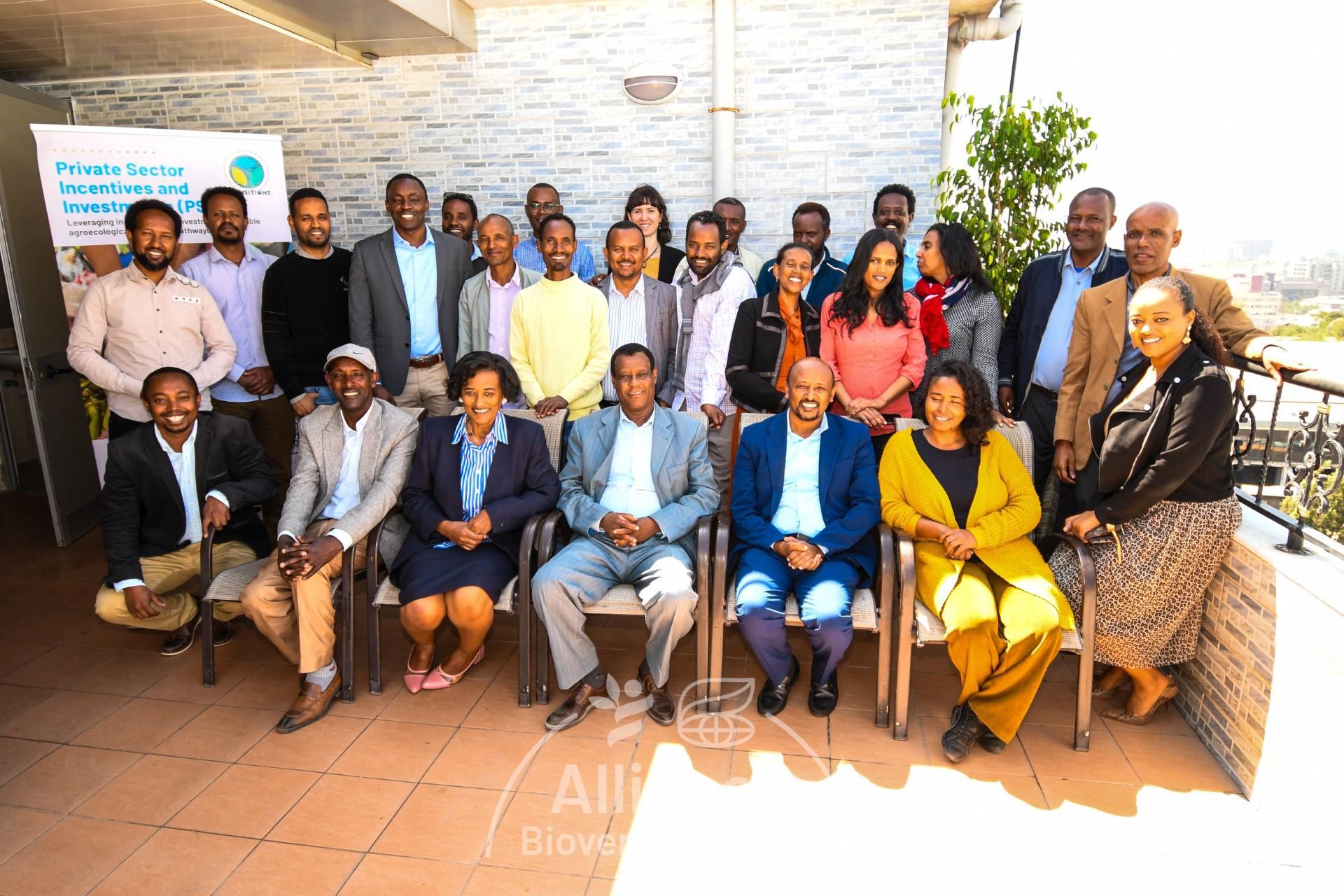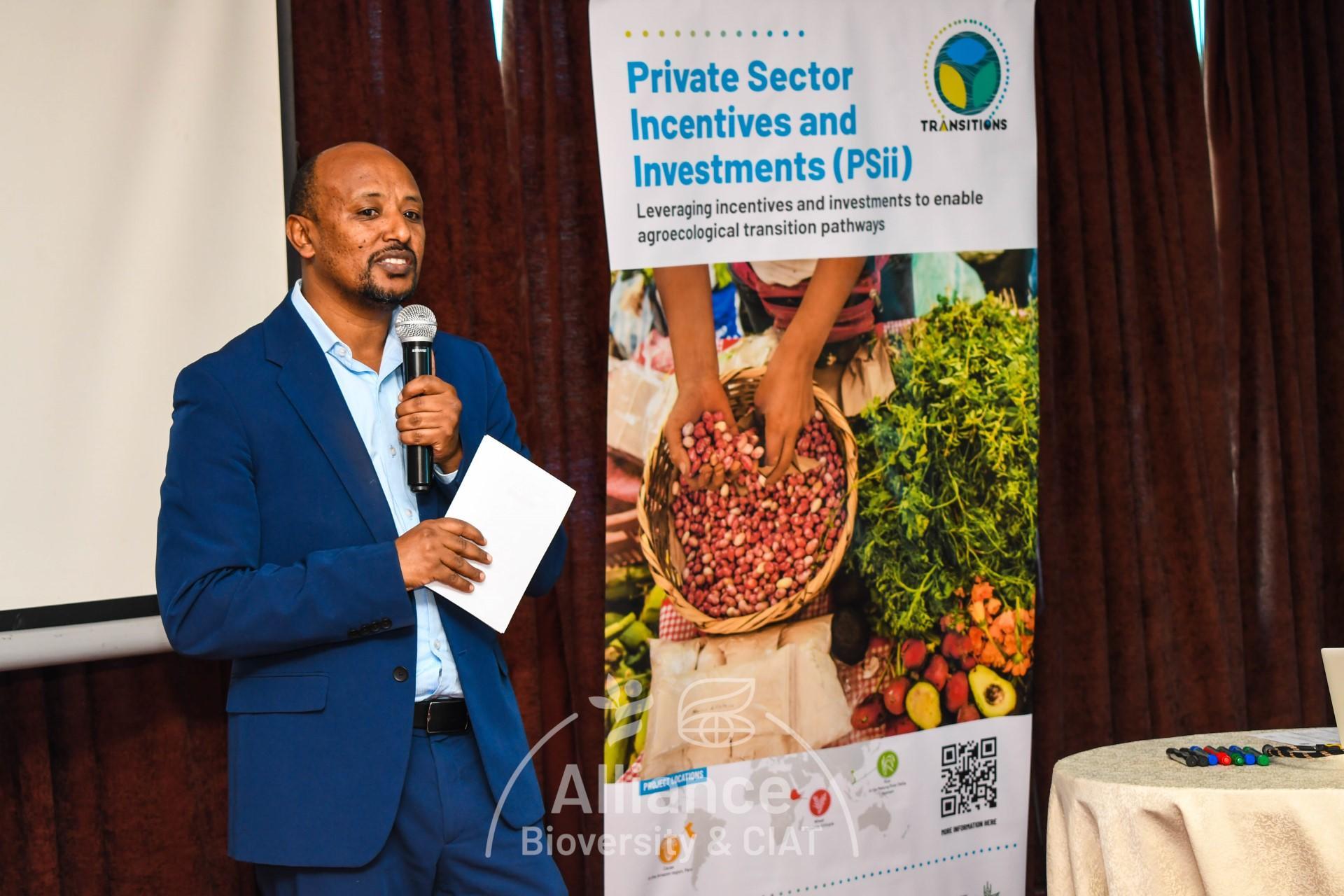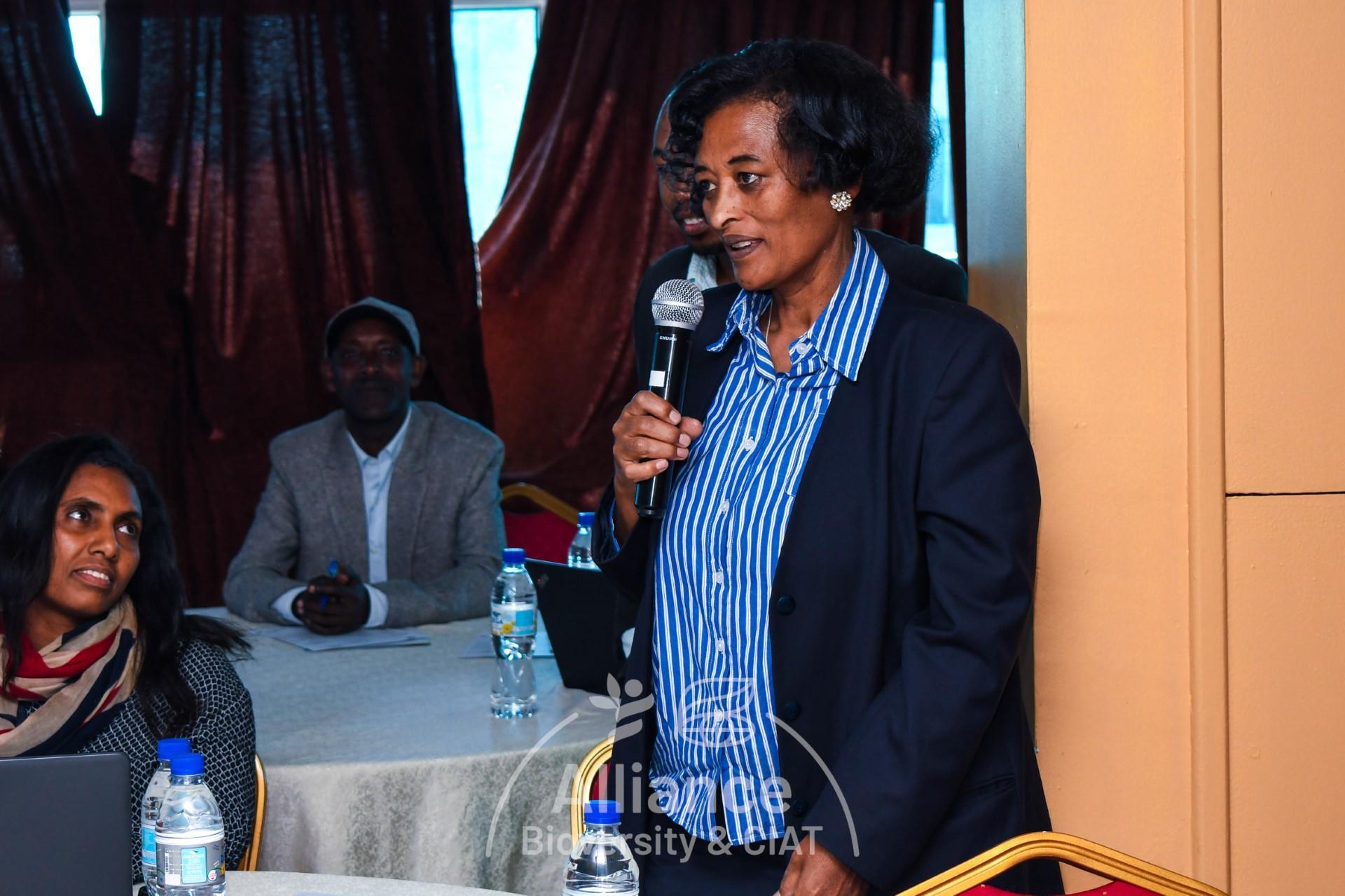Blog Enabling Agroecological Transitions in Ethiopia: The role of incentives, business models and partnerships. Insights from the PSii kick-off workshop

CGIAR’s Agroecological Transitions Programme for Building Resilient, Inclusive, Agricultural, and Food Systems (TRANSITIONS)’s Private Sector Incentives and Investments (PSii) project is working in the Oromia region, Ethiopia in line with the country’s efforts to achieve self-sufficiency in wheat production.
By: Yodit Balcha, Degefie Tibebe, Jonathan Mockshell, Sylvester Ogutu, and Helen Blum
As Africa's second-largest wheat producing country, wheat production is an important source of income and food security for farmers in Ethiopia. Nevertheless, the country heavily relies on imports for more than half of its wheat consumption. However, the effort to produce wheat mainly follows an industrial agriculture approach which is characterized by intensive external input uses. Consequently, it might not be sustainable as it has an impact on the environment and natural resources. Furthermore, climate change is expected to worsen the situation of wheat production unless agroecological practices are implemented. To address this, the TRANSITIONS- PSii project aims to implement agroecological practices as solutions to enhance sustainable wheat production, maintain the environment, and reduce dependency on imports.
The TRANSITIONS-PSii project kick-off workshop held on 29-30th November 2023 in Addis Ababa Ethiopia, brought together stakeholders from various organizations, including the Ministry of Agriculture, Ethiopian Institute of Agricultural Research, Haramaya University, MELCA Ethiopia (a civil society organization [CSO]), the International Fund for Agricultural Development (IFAD), and researchers from Goba, Munesa, and Lemo districts of Oromia region.
In Ethiopia, the TRANSITIONS-PSii project is working with farmers, CSOs, universities, researchers, and policymakers to develop inclusive incentive structures for private and public sector stakeholders to invest in agroecological transitions. These structures will help ensure that the benefits of agroecological practices are shared by all stakeholders and contribute to achieving the Sustainable Development Goals (SDGs) by reducing negative environmental impacts and improving food and nutrition security.
Linking existing efforts to develop inclusive incentives to enable agroecological transition.

Photo Credit: Owen Kimani/Alliance of Bioversity International and CIAT.
The opening remarks were delivered by Mr. Esayas Lemma, the Lead Executive of the Crop Development Directorate at the Ministry of Agriculture. He highlighted the relevance of the TRANSITIONS-PSii project in supporting the Ministry’s various ongoing initiatives, in particular, the Participatory Agriculture and Climate Transformation Programme (PACT) project, which focuses on landscape activities to contribute to poverty reduction and improved resilience of target rural households, and the Agricultural Commercialization Cluster (ACC) program, which focuses on climate-smart agricultural projects that aim to achieve sustainable commercialization. He further emphasized the need for collaborative work with research, private, and government stakeholders, as the country is in the process of evaluating the Food System 2020 Vision, to which the TRANSITIONS-PSii project contributes. He also noted that adopting a diversified approach to agronomy practices will contribute to sustainable development.
Dr. Jonathan Mockshell, PSII project leader from the Alliance of Bioversity and CIAT, presented an overview of the PSII project and why sustainable food systems are needed. The current business-as-usual food system is being threatened by conflict, climate change, and the post-pandemic impact, so we need a more sustainable, socially inclusive food system that benefits farmers. There is a need to work on incentives and investments for the private sector. Furthermore, Dr. Mockshell highlighted incentives, investments, and sustainable finance as what is needed to transform Ethiopia’s agricultural sector.
Dr. Sylvester Ogutu and Ms. Helen Blum presented the latest research results conducted by the TRANSITIONS PSii project, reviewing findings on incentive and investment mechanisms in Ethiopia’s wheat value chain and multi-stakeholder platforms as platforms. The findings sparked lively discussions and valuable insights into the challenges and opportunities for scaling up agroecological practices in the wheat value chain. Moreover, the workshop resulted in a better understanding of how conventional agricultural development investments, innovation, and business models can transition to more climate-resilient, agroecological outcomes and ensure their sustainability and equity, especially in climate-vulnerable settings. The discussions explored what is needed for the wheat value chain in Oromia to develop inclusive incentive structures for private and public sector stakeholders, as well as how to leverage investments that support agroecological transitions at multiple levels.
Opportunities for collaboration in mainstreaming agroecological practices.

Photo Credit: Owen Kimani/Alliance of Bioversity International and CIAT.
The workshop generated several important outcomes including a better understanding of the status of agroecological practices in the wheat value chain in the Oromia region, a consensus on the challenges and opportunities for scaling up agroecological practices in the wheat value chain, and a set of recommendations for policies and incentives to support agroecological transitions. One key outcome is that the project will foster partnerships with to ensure project output and outcome uptake is the Ethiopian Food Systems and Agroecology Consortium (ESFSAC), a CSO that works to ensure that agriculture and food systems become resilient. Furthermore, a Memorandum of Understanding was signed between Haramaya University and the TRANSITIONS-PSii project to integrate agroecology as an MSc. program at the university.
The kick-off event had key takeaways to support agroecological transitions in the wheat value chain:

Photo Credit: Owen Kimani/Alliance of Bioversity International and CIAT.
-
Market incentives to farmers to increase the adoption of agroecological practices.
-
Technical support to farmers is key to enhance knowledge and increase adoption of agroecological practices.
-
Adoption of agroecological practices can be enhanced through education and awareness-raising campaigns.
-
Incentives and collaboration with the private sector for scaled-up investment in agroecological technologies and services.
-
Providing a working platform for the private sector and farmers to develop and market agroecological products.
These outcomes will play a crucial role in guiding the TRANSITIONS-PSii project's components, particularly in assessing innovative incentives, finance, and business models to support agroecological transitions. Additionally, efforts will be made to enhance the capacity of local institutions to implement public-private incentives and investment models that support agroecological transitions for multifunctional outcomes.
The Team

Jonathan Mockshell
P.I and Project Leader
Degefie Tibebe
Spatial Analyst
